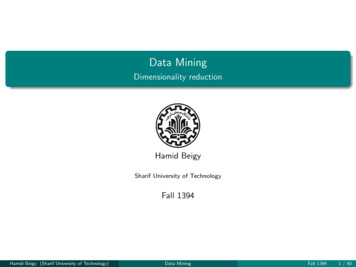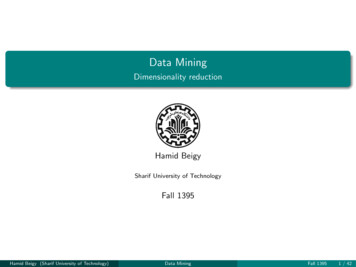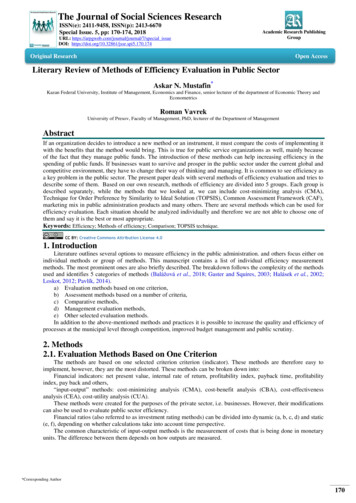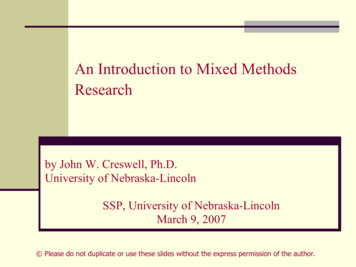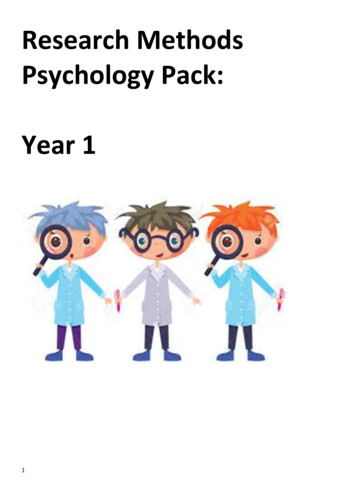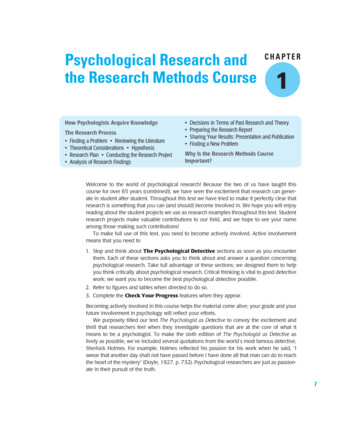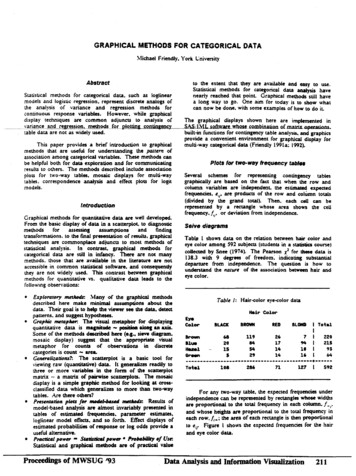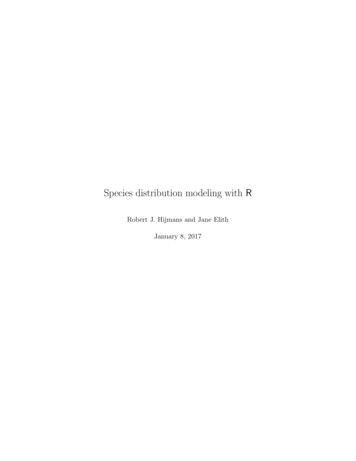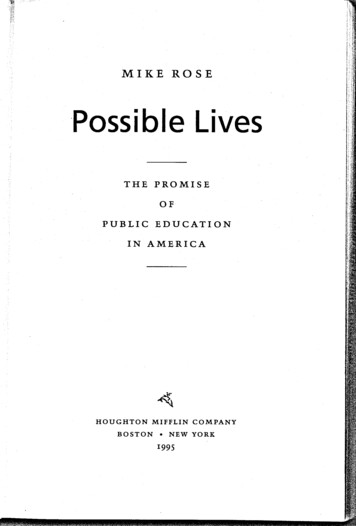
Transcription
MIKE ROSE·Possible LivesTHE PROMISEOFPUBLIC EDUCATIONIN AMERICAHOUGHTON MIFFLIN COMPANYBOSTON NEW YORK1995
Copyright 1995 by Mike RoseAll rights reservedFor information about permission to reproduce selections fromthis book, write to Permissions, Houghton Mifflin Company,215 Park Avenue South, New York, New York 10003.Library of Congress Cataloging-in-Publication DataRose, Mike.Possible lives : the promise of public education inAmerica / Mike Rose.em.p.Includes bibliographical references.ISBN 0-395-74546-2I. Public schools- United States- Case Studies. I. TitleLA217.2.B7 1995 95-3046137I'.OI'0973-dC20 CIPPrinted in the United States of AmericaBook design by Robert OverholtzerMP IO9 8 7 6 5 4 32IOn the Pulse of the Morning by Maya Angelau. Copyright I993by Maya Angelou. Reprinted by permission of Random House, Inc."Chattahoochee" by Alan Jackson and Jim McBride. Copyright I992 SONY CROSS KEYS Publishing Co., Inc., Seventh Son Music,and Mattie Ruth Music. All rights on behalf of SONY CROSS KEYSPublishing Co., Inc., 8 Music Square West, Nashville, Tenn. 3 7203.All rights reserved. Used by permission. "The World Is a Rainbow"by Greg Scelsa. Copyright I 978 Little House Music and GregorianChance Music. Used by permission. "Boa Constrictor" by ShelSilverstein. Copyright I962 (renewed), I968, and I969 by HollisMusic, Inc., New York, N.Y. Used by permission. A Breeze SweptThrough by Luci Tapahonso. Copyright I987 by Luci Tapahonso.Reprinted by permission of West End Press.For information about this and other Houghton Mifflin tradeand reference books and multimedia products, visitThe Bookstore at Houghton Mifflin on the World Wide Webat http://www.hmco.com/trade/.
6Berea and Wheelwright, KentuckyITHE LETTER ran to eight pages, eloquent, impassioned, in the or nate script of the last century:. God being my helper I shall renew the battle every day. And I trustthat ere our tongues shall be palsied in death we shall witness the reignof universal emancipation.It was written from Berea, Madison County, Kentucky, on November 5,1857, signed by John G. Fee, one of the founders of Berea College. TheReverend Fee and a few others had settled in a stretch of half-clearedwilderness - a brush-covered ridge near the foothills of the Cumber land Mountains- in the early r8sos in order to create a communityfree of slavery, an abolitionist exemplar. (The settlers named Berea afterthe city in Macedonia where the apostle Paul found a people who weredevout and open to scriptural truth- the new Bereans' hope for them selves.) Fee and his companions inaugurated a one-room schoolhouse inrBss; in r859 they drafted the constitution for a college that would be"under an influence strictly Christian, and as such opposed to sectarian ism, slave holding, caste, and every other wrong institution or prac tice." It was to be a moral place and a place of social change.Fee was a small man, "sandy complexioned" with a "kindly face,"and was a tireless advocate for a radically egalitarian, nondenomina tional Christianity. Fee was a Kentuckian himself and had been pro foundly influenced by the revivalist movements of his time, which, invarious ways, advocated emancipation, free speech (his Christianityblended with Enlightenment rationality and the Bill of Rights), femi nism, social reform (Berea College would be "Anti-slavery, Anti-caste,Anti-secret societies, Anti-rum, Anti-sin"), moral purity and humanperfectibility, and the dignity of labor. From the beginning, students
Berea and Wheelwright, Kentucky237worked at the college to defray expenses- "those who have energyenough to work their way through college will develop energy of charac ter." The Reverend Fee wanted a college that would "not merely .rnake students acquainted with science but also . educate their heartsand develop their consciences." For this, for the stand on slavery partic ularly, he and the other settlers were threatened, mobbed, and, finally,confronted by a band of armed men who exiled them from Kentucky ina drizzling rain. But Fee and his companions persisted. "Do right, trustGod, hold on, and you will see the Red Sea divide before you." BereaCollege opened its doors in t866, the only biracial educational institu tion in all the slaveholding states.I sat, on the second day of my visit to the college, in the basementarchive of the library with a box of Fee's documents spread out beforerne. I read letters to newspaper editors in Kentucky and Ohio defendingand clarifying the settlers' motives, letters to missionary organizationsand philanthropists requesting assistance, and pamphlets and sermonson topics ranging from the evils of Freemasonry to the evils of alcohol.Fee was a country preacher, a man with an unbending sense of right andwrong. As one modem, and sympathetic, commentator observed of Feeand the other Bereans, if they were to "step out of the pictures" on thewalls of the college chapel, we would probably find them to be "too 're ligious,' or too dogmatic, too absolutist, too narrow-minded, and tooold-fashioned" for contemporary taste. Undoubtedly so. But as I heldthe yellowed letters to the light, following Fee's faded script and pictur ing him intent over the page, I found myself moved in ways I wouldn'thave predicted by his courage and by the strength with which his mem ory still animated the college.Modem-day Berea has become a regional center for Appalachian craftsand folk art. Car loads, bus loads of tourists come in on the weekendsfor the music and craft fairs, for the museum with its spinning wheels,muzzle-loading rifles, and little dolls and "play pretties," and for thesmall shops along Main Street: eighty-year-old soft-white wood con structions that sell dulcimers, brooms, quilts, ceramics, and toys madeof wood and textile. Berea College sits right across the street- FORMOUNTAIN YOUTH, a Historical Society sign announces- and toursof the campus are available year round. The campus is lovely. One hun dred and forty acres of oak, maple, hickory, and magnolia, floweringshrubbery, clusters of geraniums, petunias, mums, and bluebonnets,endless leaves dappling the wood and red brick of buildings from thetum of the century.But for some faculty, the college may have become a bit too lovely.They came to Berea to teach because its history had special meaning tothem. While a few Berea faculty believe that the institution should be
Possible Livespolitically neutral and others try to urge Berea in the direction of theelite liberal arts colleges of the East, a number of the professoriate con tinually try to reclaim the school's origins. There is something uniqueabout the place- the more religious among the activist faculty use theword prophetic - and to teach there is to honor the principles of thefounders, to articulate those principles daily and to resist the kind ofsettling, the complacency, that comes with growth and establishment.One group of such faculty are those in the Department of Education.Berea College has been training teachers for the region from the begin ning. Asearly as r8s8, three years after the opening of the elementaryschool, Fee wrote to a friend that "the interests of truth and humanitynow require a school of a higher grade - one that shall prepare youngmen and young ladies to go out as teachers." fu r867 a "normalcourse" - that is, a pre-baccalaureate teacher-preparation program was established. By 1907, the Normal Department had a faculty of itsown who would go on to produce books for rural teachers: Teaching aDistrict School, Rural Arithmetic, Reading and Composition for RuralSchools. In 1931, in compliance with changing Kentucky law, teachereducation was upgraded to a four-year degree program, with the hopethat broader coursework in humanities and social sciences would createa teaching force who would, as one trustee put it, feel"less keenly thetinsel of civilization" and be "sustained by real vision." And starting inthe 1940s, and continuing to this day, the Education Department has as sisted teachers in rural, mostly public, schools with goods, workshops,and supervision - following a much older Berea tradition of sendingtraveling teachers and libraries by horseback into the hollows of Ap palachia. It is a department built on basic commitments, codified in theManual of Policies and Procedures, "to serving promising students whoare economically disadvantagedi to education of high quality foundedin the liberal artsi to the Christian ethic and to servicei to the dignityof labori to community democracy, interracial education, and genderequalityi to simple living and concern for the welfare of othersi and toservice of the Appalachian region."I had come to Berea because I wanted to get a sense of how such hu manistic and democratic principles would play out in the practice ofteacher education. During my stay, I observed one of the faculty workwith young people preparing for careers in education and talked atlength with some of them. Then, following the trail of so many earlierteachers from Berea, I traveled far into the Appalachian Mountains tovisit with people who had been teaching in the local schools for a longtime. The journey revealed much about the way tradition and innova tion can play off each other and the interrelation of hope, risk, vocation,and faith, many kinds of faith, in good teaching.
Berea and Wheelwright, Kentucky239The Education Department was in Knapp Hall, an old brick building onthe southwest comer of the campus, weatherworn, clean, wood andhigh windows on the inside. Professor Janet Fortune took the stairs in aquick fluid step that was half-shuffle, half-skip, lightly touching thebanister, telling me a story over her shoulder about her grandmother,late of Crooked Creek in the Blue Ridge Mountains: " . and as she gotsicker, poor soul, she would sing rather than talk - she .would singwhat she was going to do, you know, like 'I'm go-ing to close the win dow.111 Janet related the tale in an accent that reached its way back tosoutheast Mississippi and wound through Alabama and the Carolinas.The stairs, wood covered with tile, creaked under our step. "Well,wouldn't you know, the kids in the family started singing back to her!And pretty soon, the adults would just leave the room, and there they'dbe, singing to each other and fussing over imaginary guests, moving achair, fixing an imaginary hem ." She stopped on the landing to thesecond floor, where the faculty offices were located, and turned quicklyto me. "The adults had to leave, don't you see" -she laughed, hand toher chest. "The room was getting just too crowded!"A casual conversation with Janet Fortune slid around in mirth andgravity. She laughed often and fully- head back, eyes closed- thekind of laughter that made you feel part of the story . and terrificallyfunny yourself. But she was possessed of a deep seriousness, a tracemelancholic, and at the tum of a phrase you found yourself ponderingsomething that a moment before was flitting about in idle speech - orlaughing about something that would normally quiet you down. Shewas born in Hattiesburg, Mississippi. Her father, who went on to be come the chancellor of the University of Mississippi, came from "thehollows of North Carolina," his family "dirt poor, the one that alwaysgot the Christmas basket from the neighbors." Somehow that povertyleft its mark on Janet's consciousness. She received her B.A. from theUniversity of North Carolina at Chapel Hill, taught for years, fifth gradethrough high school, from Pascagoula, Mississippi, on the Gulf Coast,to Simsbury, Connecticut. She went back to school at the Universityof North Carolina at Greensboro for her doctorate, reading widely inphilosophy, feminist theology, and education, and when it came timeto apply for jobs found Berea College to be the place for her. "Thecall was really to work with mountain kids." So five years ago shemoved to Berea, Kentucky, with her son and bought a house on CherryRoad.We walked through the double doors from the stairwell onto the sec ond floor: a wave of heat, hardwood, high ceilings, lots of windows, thecomfortable smell of old wood. "I'm the luckiest damned person in theworld," Janet mused. We were heading toward her office, where shewas to meet with several of the student teachers she was supervising.
240Possible Lives"Teaching is a wonder- and I get to help people become a part of it."The faculty offices opened out onto a small reception area that held aworn couch and some stuffed chairs. I flopped down in one to wait forJanet while she held her conferences. She would then be teaching acourse on language arts for middle school and, later in the day, be ob serving one of her student teachers. Across the hall, a newer cohort ofeducation students began drifting into a large room for an introductory level course. Most looked to be in their late teens, though a few were intheir thirties or forties. The ratio of women to men was about four toone. I read the jackets and T-shirts: Kentucky Basketball, Berea CollegeCountry Dancers, Guns 'n' Roses, Christ Is My Life, Hard Rock Cafe,BAMA, Chill Out - this admonition scripted over two palm trees benttoward a setting sun.There are about fifteen hundred students at Berea College, So percentof them from Kentucky and the southern Appalachian Mountains. So,sitting back and listening, you'd hear a wonderful sampling of midlandand Southern speech: Alabama, Georgia, east Tennessee, West Virginia,and the different sounds of Kentucky itself: the Bluegrass, the easternmountains. What all these students had in common was that they camefrom families of modest means - the college would, with rare excep tion, accept no other - and to help with the cost, they worked ten tofifteen hours a week at jobs ranging from janitorial and maintenance, tofarming and weaving, to tutoring and community service. One of themost popular majors was education.Students entering the major had to take a set of introductory courses,and then their record was reviewed by the faculty to determine entranceto the teacher-education program. It is hard to generalize about anygroup of college students, but my conversations with the education ma jors at Berea kept revealing a high level of idealism. (As Kristi, a second year student, put it, "Teaching requires that you go that extra mile; if ateacher doesn't do that, then her dreams are just gone.") And, of course,at a Christian college many students expressed religious values, thoughwithin the Christian population here, there was quite a range of beliefs.There were fundamentalist students and students questioning theirfaith in the most fundamental way. There were those who, as anotherstudent, Yolanda, put it, "used religion as a weapon" and others who ad vocated an inclusive Christianity geared toward social justice. Most ofthe students could be located on a wide and complex middle ground.What struck me was the way Berea, true to its origins, created a placewhere both religious commitment and free speech were honored, andthat seemed to generate in the students an unusual sweep and reflec tiveness. Kristi spoke in the same few sentences about God's blessings,Moll Flanders, and Marge Piercy. About three quarters of these students
Berea and Wheelwright, Kentuckywould stay in some part of Kentucky or Appalachia to teach, primarilyin public schools.After students were accepted into the teacher-education program,they took further courses to develop an area of expertise. (Janet taught anumber of courses related to middle school.) And as the prospective ed ucators approached their senior year, they applied for student teaching,to be supervised by one of Berea's faculty. Over my stay, I would get theopportunity to talk with these advanced students, about where theycame from, what brought them into teaching, what lay ahead - theirhopes and fears.Ashley Isaacs, twenty-three,Millersburg, Bourbon County. KentuckyI've always wanted to be a teacher. My aunt's a teacher. I played teachersince I was about seven years old. I've always loved school. My motheralways taught us, if you see anybody who's hurting, you help them. Youdon't just say, "Oh, that's sad" -you go out and do something about it.Mom's always taught me to be a doer.I'm student teaching now. Kindergarten. I'm just so geared towardkindergarten. It's their first big time in school, and it's wonderful towatch the development. After a week or so, the kids will say, "Oh, thatword has two e's in it!" You get to watch this; you have a part in it. Youthink, "This is so great; this is what I've been going through all theseclasses for, to get in this classroom with these kids." You get to helpthese little people.I hope I can carry out all my ideas. I hope I won't someday turn aroundand say [snarling], "Oh, it's all the family's fault!" I hope I won't becomethat blaming person. Sure, it's hard when you're faced with problemsevery day. You'll get your heart broken. I hope I'll know how to handle it.Teachers tend to forget that something is causing a kid's problems. Wedon't look behind the behavior. We don't ask ourselves, "Now, why is hedoing that?" There's a reason behind everything a child does. It's notabout blame. I hope I get very good at understanding that.Eef Fontanez. twenty-two, Clarksburg. West VirginiaI had one horrible teacher in high school- a journalism teacher -whowould give an assignment and then read the newspaper. If we had ques tions, she'd act as if we were bothering her. And I knew that was wrong; Iknew that was not how you taught. I was about to go to college andwanted to do something with my life, and teaching just sort of came tome. It wasn't like a vision, or anything [laughs]. I always played school. Ialways helped my younger brothers and sisters- even when I was in thefourth and fifth grades. But when it came down to my senior year in high
Possible Lives'·school, I was, like, what do I really want to do with my life? And it's odd,isn't it, the way that teacher helped me make my decision. Seeing thethings she could have done differently made me see that I might have ashot at being a teacher.While I was in high school, I went to an Upward Bound program atSalem College. That's where underprivileged kids prepare for college. Iwas in it for three summers, and it helped me a lot, let me tell you. Look ing back on it, it's so clear to me. My study skills were poor. I didn'tknow how to study. But at Upward Bound I learned how. I was takingcollege classes: a math class, an English class, a history class. Just beingin that kind of college atmosphere- you know, with Doctor So-and so- that was amazing for me. Here I was, this Puerto Rican West Vir ginian [laughs], this Appalachian kid. It really helped me. I wanted toprove I could do it.During my freshman year at Berea, I took a seminar called Guns orButter, taught by one of the best professors on this campus. He would sitdown with you, no matter how late it was, and help you improve yourpaper. He wrote notes, individual notes on the computer, and handedthem back to you with your paper. And he'd encourage you to rewrite thepaper. He helped me so much to see the bigger picture- the class wasabout Central America and U.S. intervention- and those critical think ing skills have stayed with me. It's not unpatriotic to question your gov ernment. In fact, it's very American to say "This is not right." I cannottell you how it helped me, academically, intellectually, to consider dif ferent points of view. I come from a very conservative part of the coun try, and I'm still trying to resolve the conflict. Granted, Berea has itsproblems, but it is different here. I go home and feel really isolated some times. I hear things that are so racist. It saddens me. I haven't resolved it.It's been hard. You hear all this stuff.Sheila Robinson, twenty-two, Jonesville, VirginiaI was born in Rochester, New York. We lived there until I was fourteen.Then we moved to Jonesville, in the southwestern region of Virginia, andthat's where my family is now. Jonesville is all White. My family is theonly Black family in the whole town. It's a small town, nice, smallerthan Berea. My father is the pastor in a Pentecostal church. His congrega tion is all White. We moved to Jonesville because my father wanted toget us out of Rochester and come back home- he's from Harlan, Ken tucky. We kids were getting to the age where we were very impression able, and my father didn't want us to tum out bad. He wanted us to besafe. The crime was terrible. I'm glad we moved, though at first I wasdevastated. The only Black family in a small Southern town? But now Ihate to go back to Rochester. Really. It's like there's a cloud over the city,
IlBerea and Wheelwright, Kentucky243and everyone's in this tight box, and they don't know where to go anddon't know what to do. It's hard to go back.My mom, she told me once, "Sheila, I always knew that whatever youdid when you got older, you were going to work with people- you're apeople person." I, I don't know. I guess it's just that I care. I would like towork with African-American youngsters and make a difference. I want togo everywhere and help everybody [laughs], but I know that's not possi ble. So I'll work with those where the need is greatest. Wherever I'mneeded most, I'll go. They say teaching is a calling. I really like that. Acalling.In the class where I'm student teaching now, the kids are great. Youknow that fear I had when we moved to Virginia? It came back when I an ticipated my student teaching. The schools in this area are predomi nantly White, and here I come, I'm going to teach them, and I imaginethem thinking, "Humph, this Black lady, how's she think she's goingto teach us anything?" But they've been really good, so I'm kind of re laxed now. Janet told me, "You're not going to have any problems." But,still . you can say that, but you don't know. It's hard at times. You stillget hurt.Spanish and math are my areas of emphasis. And in the class I'm innow, the kids are so excited. They want to learn Spanish. Most of themnever had it before, probably never heard it before, except on TV. Whenwe lived in Rochester, I had a lot of Puerto Rican friends, and I wanted torelate to them better. One day I realized that a lot of prejudices comefrom not knowing other cultures, and I realized that taking Spanishmeant a lot more than learning words. You have to learn about theirheritage and their culture. It's not just learning the language itself, butmuch more. So when my students learn Spanish, I hope it helps get ridof the prejudices they might have, some of the stereotypes they pick upfrom TV.I guess I want my students to learn to love something- Spanish,math, whatever- and to be able to use it in their lives, to take it andmake their lives better. I want them to have the opportunities I've hadbecause I had an education, to know that they can do what they wantto do.Kathy Walsh, twenty-two, Warsaw, Gallatin County, KentuckyWhen I see a teacher who is enthusiastic and excited and loves whatshe's teaching, that makes me feel excited, too- that it's something im portant because she feels it's important. I was thinking about this theother day during my student teaching, thinking about Professor Fortune,how her enthusiasm carries over. Sometimes you don't realize howmuch you're learning. I don't know what it is she does exactly, but she
244Possible Livescan give you a whole new perspective on things. She has helped me seethings that were always there that I never noticed. And, you know, I'veseen her change her whole point of view, right in class. She'll say,"Hmm, I really need to think about that." She listens to what her stu dents say, and I think that's very important. Her classes have helped megrow. I mean it's not just in the classroom that you get more reflective,but in your life, with your family, with your friends. I've just grown somuch.I love children. They're just a joy to be with. And I guess I feel I cangive something back; teaching is something worthwhile. I wouldn't behappy doing something that's just for me. I need to give something, toteach, to show, to help guide students. But I worry that I won't knowenough. Sometimes I feel I don't know anything. I had a lot of science inhigh school, and I want to bring that into my classroom. But I don't havea lot of knowledge of history, so during the summer I try to learn as muchas I can. People say to me, "Oh, well, you're naive. You're young. Whenyou've been teaching as long as I have ." I'm sure I'll get discour aged. I'll have my bad days. But if that drive to teach ever goes away,well . I'd be doing more harm than good. And the kids can tell. Theyknow.My family and I travel around a lot, and some of the best teachers Ihave ever seen are here in eastern Kentucky. Some of them are workingwith no materials, and yet they're teaching something worthwhile,something valuable. You hear so much about the kids and poverty that they're poor and stupid and they can't learn- but I've seen suchgifted children. When I go home and I hear people in northern Ken tucky- which is wealthier than here- when I hear them complain ing because they don't have this or that, I just think, "If you could onlysee ." I want to teach here in eastern Kentucky. The teachers have somuch less to work with, but they have so much more inside.Janet opened her class, Reading and Language Arts for the MiddleGrades, by raising some fundamental questions about literacy. Sheasked her students to "take fifteen or twenty minutes and jot downwhat comes to your mind when you think about literacy. How wouldyou define it? In our society, who gets to define it? What are your per sonal associations to literacy?" This wouldn't be evaluated; studentscould write it any way they wanted. It was a warm-up. Central to Janet'spedagogy was the desire to promote a reflective cast of mind, a willing ness to consider the habitual ways we think about curriculum, aboutlearning, about children. "Why am I doing this?" was the basic questionshe wanted her student teachers to ask. "Why am I thinking this way?"I was sitting on the floor next to a cordial, sandy-haired man namedDwayne Satterfield who let me look over his shoulder as he wrote:
Berea and Wheelwright, Kentucky245We are quick to rubber-stamp individuals as illiterate before coming tounderstand the "why" of this person's present situation. My father was amillwright in a factory for 35 years. He knew his work inside and out;however, with increased technology he became more illiterate year byyear.This was a tiny class, the smallest Janet had ever taught, so she heldit in her office. It was all male- another first. Janet sat in a rockingchair by her computer; the rest of us sat around the room, in chairs,cross-legged on rugs, or backs against the wall. A fiddle-leaf philoden dron curled close around the old silver radiator; red and brown shawlshung over the backs of gray metal chairs; and a full, hanging ferndropped its leaves on a stack of books on language arts. The books them selves, packed into cases along three of the four walls, looked like a multi colored patchwork: blue spines and yellow, orange and black, tan andwhite. There were whole sections on the philosophy of language, on fem inist theology, on adolescent literature- as well as all the books on ed ucation. Looking around the room, I could see Robert Coles's The Callof Stories and Sharon Welch's A Feminist Ethic of Risk, Roald Dahl'sCharlie and the Great Glass Elevator, and, over my shoulder, a row ofbooks on phenomenology and critical theory: Heidegger, Merleau Ponty, and Max Horkheimer. And novels- from The Idiot to GloriaNaylor's Mama Day- were interspersed everywhere. By the window, aposter for the Children's Defense Fund made its appeal in pastel yel lows, blues, and grays. Next to the fern, an advertisement from theCrazy Ladies Bookstore featured a flower erupting in violet and fiery red.After twenty minutes or so, Janet told the class to wind up what theywere doing, but to keep in mind what they wrote as the rest of the dayprogressed. Janet was a working philosopher, trying continually to con vert her academic study of philosophy, theology, and language to thepractice of teaching. One way she did this was through the use of art andliterature. Last semester, for example, she asked students in an intro ductory course to represent with construction paper, Magic Markers,scissors, and glue what they thought about when they thought aboutschool. One student made an eye, another made a short row of desks,and Janet urged them to talk out the beliefs that led to these construc tions - school was for seeing, school was for order - and the differentkinds of classrooms that would emerge from such beliefs. Her hope wasthat through the use of analogy, through the use of a range of media, shecould encourage a shift in perspective, could spark reflection. Today shewas going to rely on a story by Tillie Olsen called "I Stand Here Ironing"to forward her discussion of literacy. She reached into her bag andpulled out a book. "I want you to think about school while I read this,"Janet said. "See what you think."'','.;
Possible Lives"I Stand Here Ironing" is a brief, first-person story, an agitated mono logue filled with recollection, directed to a teacher who had phoned ask ing the narrator to come see her about her daughter. The request hasupset the speaker- "what you asked me moves tormented back andforth with the iron"- and triggers a tale of Depression-era poverty.The speaker recounts, with pain, the way she had to let others raise heroldest daughter, Emily- the subject of the phone call- so that shecould work, the effect this had on Emily - the vulnerability, the sad ness- and the bringing of Emily back into the family, but only afterthe girl had absorbed the loss, too late to make things whole again. Thespeaker tells of Emily's uncertain growth in s
land Mountains-in the early r8sos in order to create a community free of slavery, an abolitionist exemplar. (The settlers named Berea after the city in Macedonia where the apostle Paul found a people who were devout and open to scriptural truth-the new Bereans' hope for them selves.) Fee and his companions inaugurated a one-room schoolhouse in
